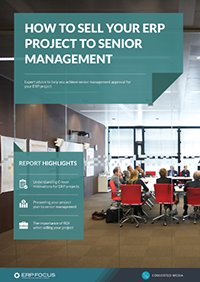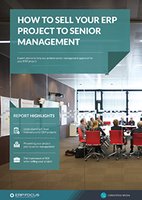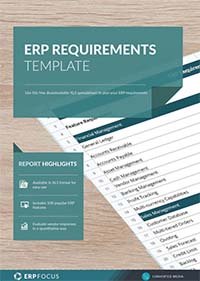What are C-suite’s requirements for a new ERP?
As one might expect, evaluating a new ERP system from the senior manager suite is a highly subjective experience. Every C-level is different and each individual carries his/her own experiential baggage to the table.
However, having been or worked with senior managers for more than three decades, there are some common areas of agreement, when it comes to what ‘they’ want from complex enterprise systems like ERP platforms. Consequently, here are four of the more important areas of focus, when considering ERP values from the perspective of managers perched above the madding corporate crowd.
Increased operational efficiency
Senior managers live and die on the basis of performance. Their working days are filled with metrics, analytic reports, and remote or face-to-face meetings based on delivering short, mid, and long-term risk decisions that can affect the stability and valuation of a particular enterprise.
Sell your ERP project to senior management with this step-by-step guide
While ERP’s well-understood cost requirements usually come to the fore soonest, what they really want to know is ‘what’ a system will do for the enterprise, and as a corollary, what that system will do to either help or hurt their own peer-to-peer credibility. Consequently, promotable events based on operational efficiency become paramount since they really don’t do things so much as they think about things every day.
Reductions in operational failure
In the same way that the measurement of increased efficiency plays a positive role for the C-level, similar metrical reports showcasing reduced operational failure also plays a part. Measurements like this become particularly important to COO’s and CFO’s since in the first case, the whole rationale for a COO is to ‘operate’ effectively, while on at finance floor, reduced failure typically implies limiting enterprise operational costs.
Enhanced accuracy in sales projections
From an administrative perspective, particularly at the EVP, COO, and CFO levels sales forecast accuracy is another sweet spot. In this case being able to understand what is and isn’t going to be run through a company’s revenue pipe can determine how much money those managers can expect as ‘plow backs’ into their own budgets.
This then becomes a bargaining chip when it comes to accruing and requesting financial support from the CFO and COO, along with also ensuring that the CEO is obviously mindful that the sales team is really where ‘all the money comes from.’
More dependable cost-accounting
This is where the CFO and the COO operate on a daily basis. Believe it or not, many companies don’t operate on the basis of a cost-first approach,tending to act on news related to the revenue side of the enterprise business continuum.
Nevertheless, whether your company is too small to call a single individual a CFO or a full-charge bookkeeper, the job is the same: ensure that the company is well-controlled, and able to operate comfortably across the long-term. This is where better than average cost-accounting reports becomes the tool of preference, since if a company can’t accurately identify and report its costs clearly enough, over time it’s likely that the company’s revenue projections will also be will irregular.
So there you go. Again, each enterprise team is different, but if you take these four suggestions and overlay them over your own situation, I bet you’ll find common ground fairly quickly.
Free white paper

How to sell your ERP project to senior management
Expert advice to help you achieve approval and funding for your ERP project

Featured white papers
-

How to sell your ERP project to senior management
Expert advice to help you achieve approval and funding for your ERP project
Download -

ERP Requirements template
Plan your ERP selection using our requirements template with 100 features in an editable spreadsheet. Include special requirements and extra detail in this exclusive template.
Download -

70 features to look for in your next ERP
A comprehensive guide to help you identify requirements for your ERP selection
Download
Related articles
-

Seven must-haves for construction ERP
Include these must-have requirements during your Construction ERP selection
-

CMMC Compliance: What Aerospace and Defense Manufacturers Need to Know
Key insights on CMMC compliance, deadlines, and securing DoD contracts with CMMC 2.0 certificatio...
-
![3 Tips for Achieving Buy-In for Your ERP Integration [by pressfoto on Freepik] 3 Tips for Achieving Buy-In for Your ERP Integration [by pressfoto on Freepik]](jpg/3%2btips%2bfor%2bachieving%2bbuy-in%2bfor%2byour%2berp%2bintegration%2b%255bby%2bpressfoto%2bon%2bfreepik%255d65d7.jpg)
3 tips for achieving buy-in for your ERP integration
Read our expert’s tips on getting your ERP integration project off the ground by achieving busine...

